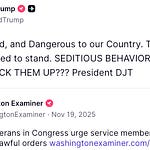President Trump yesterday evening withdrew the nomination of Alina Habba for U.S. attorney for the District of New Jersey so that Attorney General Pam Bondi could appoint Habba as the “first assistant” in the U.S. attorney’s office—with the aim of positioning Habba to serve as U.S. attorney in an acting capacity. This came after DOJ, purportedly pursuant to the president’s authority, fired the official who was appointed by a panel of district judges to serve as interim U.S. attorney.
We’re pleased to welcome Anne Joseph O’Connell, the Adelbert H. Sweet Professor of Law at Stanford Law School, as our first guest on Executive Functions Chat to break down the relevant legal issues in this saga and discuss the broader legal landscape.
This is an edited transcript of an episode of “Executive Functions Chat.” You can listen to the full conversation by following or subscribing to the show on Substack, Apple, Spotify, or wherever you get your podcasts.
Jack Goldsmith: Today we're going to do something a little different on the Executive Functions chat. Normally, Bob Bauer and I talk, but we're going to start talking with experts other than ourselves. And today we're honored to have as our first guest Anne Joseph O'Connell from Stanford Law School.
Anne is one of the leading scholars in the country of administrative law and related issues. And she's also the country's expert in issues related to appointments and vacancies. We're going to talk today about the goings-on in the U.S. Attorney's Office in the District of New Jersey. There was news this afternoon that we're going to get to in a second.
Anne, welcome. I'm going to start off by just reciting the facts about what's happened. And then I think we should just march through and explain the legal issues and the complications, and then we'll talk about the bigger picture. Okay?
So basically what happened was President Trump apparently appointed Alina Habba as the interim U.S. attorney for the District of New Jersey. He did this pursuant to 28 U.S. Code 546, which allows an interim appointment. 546, as we'll discuss, actually says that the attorney general is supposed to nominate this person. And apparently it was initially done by President Trump.
As the 120 days was approaching—the statute prescribes that this interim appointment is for 120 days—the Federal District Court of New Jersey, acting under a different provision of the same statute, appointed someone different: Desiree Grace.
They did this pursuant to a provision that says once the 120-day appointment expires (and there’s some dispute about when that expiration happens), the district court can appoint an interim U.S. attorney. At that point, Desiree Grace was fired, perhaps by President Trump, or at least by the Justice Department acting on behalf of President Trump.
And then finally, this afternoon, we had more developments. Trump had also nominated Habba to be the permanent U.S. attorney, and her nomination was going to the Senate. Today, she withdrew from that, and Trump withdrew her nomination. Then Attorney General Bondi appointed her the first assistant in that office.
The reason they did that, as we'll explain, is because she will become the acting U.S. attorney under a different statute, the Federal Vacancies Reform Act. Okay, those are the facts. We're going to unpack that from the very beginning.
So, Anne, the first question I have is: Was she originally appointed? Section 546 says the appointment needs to come from the attorney general. And as you noted in something you wrote about this, it was actually done by the president. So is that a problem?
Anne Joseph O’Connell: Depends if you're a formalist or a functionalist. For a formalist, under the Appointments Clause, for these lower-level positions—what we call inferior offices—Congress can allow an alternative to the Senate confirmation process. Congress can choose the president alone, a head of a department, or a court of law.
But Congress didn't choose the president-alone option. It said the attorney general may appoint a U.S. attorney. So, as a formalist, you could argue that unless Attorney General Bondi selected Alina Habba, the presidential appointment of her under Section 546 is not allowed.
Now, I'm not a formalist. I'm more of a functionalist. And I think, well, given current case law under the Supreme Court, especially for heads of departments that are classically executive—the core cabinet departments that fall directly under the control of the president—I don't see much light between the president appointing and a head of an executive department appointing. In any event, it could get corrected. Maybe she could do her 120 days, but I think that would produce challenges from the start.
After the clock runs, Grace is appointed by the district court pursuant to this statute, which the statute seems to authorize.
Which it can do. We have many court-appointed U.S. attorneys because, it turns out, our political appointment system is not the most effective. It takes a long time to nominate and confirm people. We have blue slips for U.S. attorneys. So we often see interim U.S. attorneys appointed by the attorney general, and we also see those people (it’s usually the same people) then getting extended by the district court.
Okay. So then the next thing that happens is that Grace is fired. At first it wasn't clear who fired her. The deputy attorney general later said that, pursuant to the president's authority, she was fired. So it seems like she's been fired. She’s been notified of her termination. Not exactly clear on what authority they did it—they’re trying to claim the president's authority—but it's not clear if the president actually did the firing. So, is she fired?
Again, maybe. Are you a formalist or a functionalist? This came up with the firing of Geoff Berman in the first Trump administration. Was it Attorney General Bill Barr or was it President Trump trying to get rid of him in the Southern District of New York? It took a couple of days, and finally he stepped back. Someone from the White House must have gotten involved.
Maybe on a personal level—I actually went back to compare Todd Blanche's email, which talks about presidential authority to fire Alina Habba. And I went back to my own message from Sergio Gor, head of presidential personnel. I was a part-time Biden appointee, and I was fired on January 21st. And it says, “on behalf of President Donald J. Trump.”
So, maybe it’s a formalist distinction. I assume they're going to dot their i's and cross their t's. I mean, if Grace were to—are we going to see her suing the new replacement? But I mean, I think the statutory claim about who fired her, given the Blanche post, seems on the weaker side.
So let me ask you, then: If she was fired by President Trump, it seems clear he has the authority to do that. Do you agree?
Yes. It’s a little bit of a twist on constitutional law, because we normally think for these lower level positions that still have authority—what we call inferior offices—the Supreme Court has many times reiterated a rule that the power to remove follows the power to appoint, unless Congress specifies otherwise. Under that rule, which it just recently said in the Braidwood case this past term, that would mean the court appointed, only the court could remove.
But that presents, I think many would agree, a separation-of-powers problem. So that’s why the Office of Legal Counsel wrote an opinion saying, because the separation of powers concerns the president (not the attorney general who has a role in 546), that only the president could fire.
It seems to me that decision is turbocharged by Trump v. United States, which talked about the president's extraordinary authority over the Justice Department and prosecutorial discretion and the like. Especially after that case, it seems clear to me this Supreme Court would say that this president has the authority to fire.
I agree with that.
So, do you agree with me: It seems like as long as they make clear Trump did this action, Grace isn’t going to be able to bring a successful legal challenge.
I think that's right. It reminds me of the CFPB controversy in President Trump’s first term, where the head of the CFPB left, and on his way out the door, Richard Cordray puts Leandra English as number two. And under one statute, she becmes the acting director, but under the Vacancies Act, Mick Mulvaney was named the acting under Trump. And she had actually sued. It’s kind of interesting, you know, within an administration, but I don’t think it’s likely to be a successful challenge.
Now let’s talk about today’s developments. This afternoon, the president withdrew Habba's nomination to be the Senate-confirmed U.S. attorney. The attorney general then appointed her as the first assistant in the office, which makes her acting U.S. attorney under the Federal Vacancies Reform Act. So this is a different statute—it’s not 28 U.S. Code 546; it's a different method of appointment. Walk us through what happened, why they did it this way, and what the significance is.
Sure. So Section 546, the interim provision that we've been talking about, allows the interim to also be the nominee. But this broader statute that covers more than just U.S. attorney positions, covers a huge range of Senate-confirmed roles—the Federal Vacancies Reform Act of 1998—it makes it really hard to be both acting and the nominee. And indeed, under its complicated provisions, Habba could not be the first assistant and the nominee. So, in order to get her in, under the Vacancies Act, they had to pull the nomination.
So two things come to mind. The first is what was happening in the Northern District of New York. There, we had an interim U.S. attorney selected by the Justice Department, AG versus Trump. He was not picked by the district court. That district court did not choose a different person. But he was then put into the first assistant role and is now the acting U.S. attorney for the Northern District under the Vacancies Act. But he had never been nominated for the job. So they've made the situation like that one. She's now the first assistant.
By withdrawing the nomination, you mean?
By withdrawing the nomination. She’s no longer the nominee.
But the second thing that comes to mind is: will she be the nominee again? Because of these complicated provisions of the Vacancies Act, which the Supreme Court also got into in 2017 and really kind of limited, from a standard executive practice, who could be the nominee in the acting, the question is really are we actually going to see her as the nominee again?
And why do I say this? Well, so Mark Esper, in Trump's first term, was the acting defense secretary. But then the administration decided they wanted him to be the permanent defense secretary. But he couldn't, under the Vacancies Act, be both the acting and the nominee. So what they did is they coordinated with the Senate so that the formal nomination was submitted right before the vote. So Esper was acting secretary, he steps down, someone else goes in for a few days as the acting secretary, and then he's confirmed, all to deal with all of these provisions of the Federal Vacancies Reform Act. And I wonder if that will happen here.
I think there are some differences. Esper clearly had a lot more support. But if there’s enough support in the Senate to get that nomination through with coordination between the White House and the Senate, that is something that could happen.
And this is the only way to get her in now, at least consistent with the standard interpretation of the other statute.
Right, you you can't have successive appointments, even though we saw Ed Martin to Jeanine Pirro in DC.
Right, but that was a different person, not the same person. So they might have thought that they couldn’t have appointed her under 546. Meaning if they want to get her in now, this is the only way to do it by statute. And you’re speculating that maybe they’re still going to nominate her, but they’ll let her serve in this acting capacity.
By the way, how long can she serve in the acting capacity?
Well, that's actually an interesting question because the clock runs from the vacancy. And is the vacancy the departure of the last Senate confirmed person, or is it her departure from the interim appointment? It kind of works out to the same amount of time because if it's the former, she would get 300 days because then the vacancy would have happened early on in an administration and there's a longer period for acting service under the Vacancies Act. But if it dates from her departure from the 120-day appointment, then it would be 210 days, which basically works out.
So either way—first of all, do you think that this is a valid appointment under the FVRA statute?
Yes.
Okay. So she’s going to be the acting U.S. attorney under the Federal Vacancies Reform Act, either 200 and some odd days or 300 and some odd days.
Yeah—the only legal question about first assistants and default actings has to do with OLC, where you've been, actually changed its mind on this question, which is whether you could name a first assistant after a vacancy. First they said no, then they said yes, but here we don't even have that wrinkle. That question hasn't been decided by the courts, but here it looks like she's been named the first assistant before the vacancy. Here, defining the vacancy though, as the end of interim service, which I think probably is the better reading.
So she’s probably validly appointed as acting. So the idea here, as you said, just to repeat, may be to allow her to perform right now as the acting under the Federal Vacancies Reform Act, and then down the line, re-nominate her and work it out with the Senate such that the nomination is processed in a way that she can quit this job for a few days and then be confirmed to be right back there, take a weekend off or something like that.
Exactly. Now, I don't know anything about the politics or the machinations in the White House, but it did happen in the first Trump administration and it's possible.
Yeah, it's possible. And so it's either going to be that or she's going to serve for the 200 and some odd days or 300 and some odd days. And so this issue is basically resolved now for the foreseeable future.
That’s right.
Okay. So this all seems—if we just step back from the legalisms a little bit—his all seems a bit crazy in terms of all these games that get played on both sides, on the presidential side and the Senate side. Let's just zoom out the lens and talk about the bigger picture here of what's going on and how we should think about this issue.
Right. So we're trying to balance competing objectives. On one hand, the Constitution has an appointments clause, which has sort of accountability mechanisms and the role of the Senate in the appointments process. But that process takes a really long time in recent administrations. Nominations take a while to form. The confirmation process churns along.
And on the other side, we want a workable, operating government. And so sometimes we're not in the first best world where we have quick confirmations of U.S. attorneys —because there are blue slips, because there are many other positions to nominate for. And these interim statutes or acting statutes provide a way of getting people in temporarily to keep the gears of the government working.
Now, Congress could make it simpler by decreasing the number of Senate confirmed positions because for inferior officers under the appointments clause, they can choose one of three alternatives, the president alone, head of a department, court of law. But those all require Congress to give up power.
So what we have now is a kind of functional equivalent to cutting Senate confirmed positions—not what was imagined formally under the appointments clause, where these statutes basically allow for the cutting of Senate confirmation in these lower-level leadership positions. But this idea that when can you be the acting and the nominee, these games that could get played, there's one reform that was suggested after the Mark Esper situation, which was to allow people who had been confirmed to another job to also be the nominee to a different job and the acting for that second job. So Mark Esper in this reform, if it were to be adopted by Congress, would not have had to step down. But Habba under this reform, would.
And I think that reform makes a lot of sense because when you’ve gone through the confirmation process once, why are we playing these games about stepping down and stepping back up?
But if I understand the bigger picture, the bigger, it's that the Senate, the Congress and the Senate have insisted on 1,300 or so (depending on how you count, I know the count differs) presidential-appointed, Senate-approved slots for the executive branch. The Senate does not process those very fast. Sometimes the president is slow in nominating. And sometimes the Senate plays games with the confirmations. Presidents of both parties get frustrated and they have all of these statutory tools. There are the Federal Vacancies Reform Act, which has various options. There are the local statutes, and then there are some other statutes kind of spread around the executive branch. And the executive branch has gotten very, very good at finding loopholes in ways to circumvent the Senate confirmation requirement in effect. And that's basically what happened here.
Yes. That’s exactly what happened here.
Anne, thank you so much. That was very elucidating.
Thanks, Jack.













